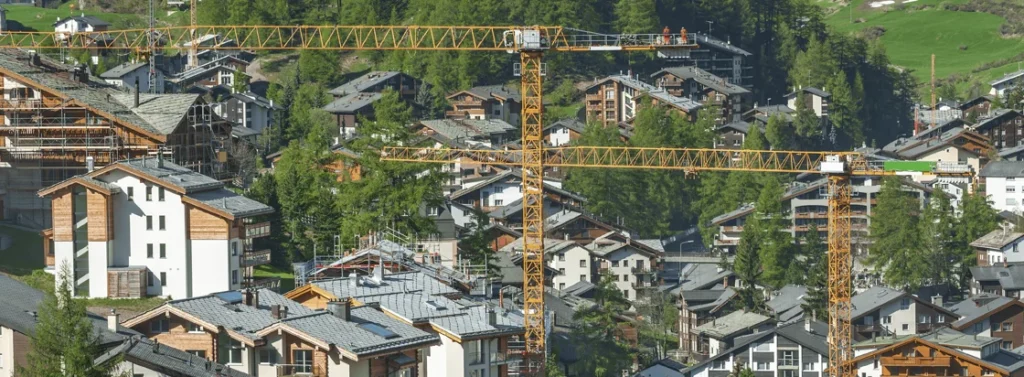How Passive Owners Could Lose Their Development Rights

A recent landmark decision by Switzerland’s Federal Court on 27 November 2024 in Mellingen (AG) has sent shockwaves through the real estate sector, introducing unprecedented risks for owners of undeveloped land. The ruling empowers municipalities to rezone building plots without compensation if landowners fail to demonstrate active development efforts. This legal shift prioritises housing and infrastructure growth over passive landholding, fundamentally altering the balance of power between property owners and local governments.
For decades, landowners in Switzerland could hold onto undeveloped plots with relative security, relying on zoning designations to preserve long-term value. But the court’s decision now places the burden of proof on owners to justify retaining building rights—or risk losing them entirely. Here’s what this means for landowners, investors, and developers.
The End of “Wait-and-See” Strategies
The Federal Court’s decision centres on a case where a municipality reclassified a plot of building land into agricultural land after years of stagnation. The landowner argued that the rezoning constituted an unlawful expropriation, but the court sided with the municipality, emphasising that speculative holding of undeveloped land contradicts public interest in addressing housing shortages and sustainable urban planning.
Key takeaways from the ruling:
- No compensation for rezoning: Municipalities can downgrade land designations (e.g., from residential to agricultural) without financial liability if owners show no credible progress toward development.
- Active use is mandatory: Landowners must provide evidence of concrete plans, such as preliminary permits, architectural drafts, or partnerships with developers.
- Timelines matter: Projects stalled for years without justification are now vulnerable to rezoning.
This ruling reflects a broader European trend prioritising active land use to combat urban sprawl and housing crises. In Switzerland, where developable land is scarce and demand for housing is acute, the pressure on passive landowners has never been higher.
Why This Changes Everything
For landowners, the risks of inaction are twofold: financial devaluation and loss of control. A plot rezoned as agricultural land, for example, could lose 80–90% of its market value overnight. But beyond the immediate financial hit, the ruling sets a precedent that could embolden municipalities to scrutinise undeveloped plots more aggressively.
Who’s most at risk?
- Owners of inherited land with no clear development strategy.
- Investors holding plots for long-term appreciation without active plans.
- Developers delayed by bureaucratic hurdles or funding gaps.
Municipalities are now incentivised to reclaim underutilised land to meet housing targets, infrastructure projects, or green initiatives. In cities like Zurich, Geneva, and Basel, where housing affordability is a hot-button issue, local governments may use this ruling to fast-track rezoning of dormant plots.
How to Protect Your Land (and Its Value)
The court’s message is clear: Visibility and momentum are critical. To avoid rezoning, landowners must proactively demonstrate progress. This doesn’t mean breaking ground immediately, but it does require tangible steps:
- Secure pre-permit approvals: Submit feasibility studies or environmental impact assessments to show intent.
- Partner with developers: Formal agreements signal serious commitment to stakeholders.
- Leverage flexible financing: Traditional lenders often require permits before releasing funds. Alternative solutions, like mezzanine financing, can bridge this gap.
Foxstone’s Solution: Act Early, Stay Ahead
At Foxstone, we specialise in unlocking the potential of undeveloped land even before permits are secured. Our mezzanine financing model provides the capital and flexibility needed to:
- Fund feasibility studies, surveys, and design work.
- Accelerate timelines to meet municipal expectations.
- Demonstrate credibility to local authorities through visible progress.
Unlike traditional loans, our financing is tailored to the pre-development phase, turning stagnant plots into actionable projects. This approach not only safeguards zoning rights but also positions landowners to capitalise on rising property values as plans advance.
The Clock Is Ticking
The Swiss legal landscape is shifting rapidly, and municipalities are already revising zoning policies to align with the Federal Court’s ruling. For landowners, the choice is to adapt or risk losing asset’s value:
- Audit your portfolio: Identify plots with minimal development activity.
- Engage professionals: Architects, lawyers, and financiers can help build a credible roadmap.
- Secure early-stage capital: Explore financing options that don’t require permits.
Don’t Wait Until It’s Too Late
The era of passive land ownership in Switzerland is over. The Federal Court’s decision rewards proactive development and penalises inertia. Whether you’re a family holding generational land or an investor eyeing long-term gains, the time to act is now, before your plot is “zoned out” of its potential.
Secure the right financing early with Foxstone to preserve your building rights in the long term.
Learn more about project financing.



